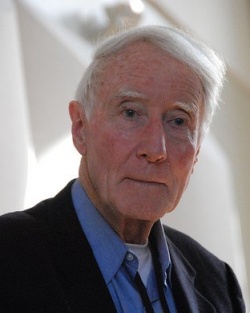Peter Dale Scott
Peter Dale Scott is the early 21st century Doyen of Deep Political Theory
Brief Biographical details
Peter Dale Scott (born 11 January 1929) is a former Canadian diplomat, and retired English professor at the University of California, Berkeley. The son of noted Canadian poet and constitutional lawyer F. R. Scott and painter Marian Dale Scott, [1] he is known for his anti-war stance and his criticism of U.S. foreign policy dating back to the Vietnam War. He spent four years (1957-1961) with the Canadian diplomatic service. He retired from the UCB faculty in 1994. He is currently a Deep Politics researcher.
Investigator
Scott has earned a reputation for painstaking research and caution in his publications. Scott rejects the label of "conspiracy theory" and has coined the phrase "deep politics" to describe his extensive investigations into the role of the "deep state" (as opposed to the "public state"). Daniel Ellsberg commented about his most recent book, American War Machine: Deep Politics, the CIA Global Drug Connection, and the Road to Afghanistan (2010), "I said of Scott's last, brilliant take on this subject, Drugs, Oil and War(2003), that 'It makes most academic and journalistic explanations of our past and current interventions read like government propaganda written for children.' Now Scott has written an even better book [...]"[2]
The Road to 9/11 (2007), deals with historical and geopolitical context of the events of 9/11, and describes "how U.S. foreign policy since the 1960s has led to partial or total cover-ups of past domestic criminal acts, including, perhaps, the catastrophe of 9/11.[3]
An interesting aspect of Scott's work that combines both his investigating interests and his poetry is illustrated by Lobster Magazine article The Global Drug Meta-Group: Drugs, Managed Violence, and the Russian 9/11. [4]
Literary Works
Scott has described his poem Minding the Darkness as his most important, though he concedes that "Like other long poems by older men. . . it toys dangerously with abstract didactic principles." Introductory matter to excerpts from Minding the Darkness. [5] The poem is intended as the culmination of a major poetic project of which Coming to Jakarta was the inception.
See Also
- Peter Dales Scott's personal web site
- Peter Dale Scott on Unwelcome Guests - A Collection of Radio shows featuring Peter Dale Scott
References
- ↑ Peter Dales Scott's personal web site
- ↑ http://www.rowmanlittlefield.com/Catalog/Reviews.shtml?command=Search&db=^DB/CATALOG.db&eqSKUdata=074255595X
- ↑ ISBN 0520258711 The Road to 9/11
- ↑ The Global Drug Meta-Group: Drugs, Managed Violence, and the Russian 9/11 - Peter Dale Scott - Lobster Magazine
- ↑ Minding the Darkness. Poem by Peter Dale Scott with explanatory introduction
